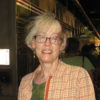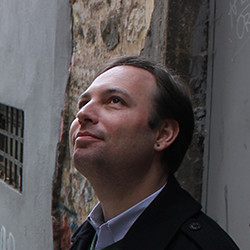by Susan Ludvigson
Could it have been the very day we met?
It was, walking a long path through
the woods until the sun was down
and we talking, talking, words pushing
against each other softly, like nudges,
until it was wholly dark, long past
supper, past bedtime, before
you told me things I didn’t know how
to hear, before the shocks of your war
began to shade into horror. But that day
turned night we made our way to a pool.
Shedding clothes in the dark,
as we entered, the elements
seemed to collude, water became
the warmth of air, and when
we became a single body,
it was what the diver I read today
described–ocean as vast as outer space.
The coral reefs he clung to might have been
ledges on planets, as close as he could come
to drifting among the stars, the way light
moved and flashed, and bright-hued fish,
plants swaying iridescent into his vision,
a kind of brilliance he hadn’t known
in any other realm.
—
Susan Ludvigson has published eight collections with LSU Press, received Guggenheim, Fulbright, NEA, and Rockefeller fellowships, and has published in Poetry, Georgia Review, Southern Review, Ohio Review, Atlantic Monthly, and others. Wave As If You Can See Me, her new collection, comes out from Red Hen Press in Fall 2020.
 John Nizalowski is the author of four books: the multi-genre work Hooking the Sun; two poetry collections, The Last Matinée and East of Kayenta; and Land of Cinnamon Sun, a volume of essays. Nizalowski has also published widely in literary journals, most notably Under the Sun, Weber Studies, Puerto del Sol, Slab, Measure, Digital Americana, and Blue Mesa Review. Currently, he teaches creative writing, composition, and mythology at Colorado Mesa University.
John Nizalowski is the author of four books: the multi-genre work Hooking the Sun; two poetry collections, The Last Matinée and East of Kayenta; and Land of Cinnamon Sun, a volume of essays. Nizalowski has also published widely in literary journals, most notably Under the Sun, Weber Studies, Puerto del Sol, Slab, Measure, Digital Americana, and Blue Mesa Review. Currently, he teaches creative writing, composition, and mythology at Colorado Mesa University.




 Abhijit Sarmah is a Masters in English student at the University of Dibrugarh, Assam, in India. He wrote a chapbook, The Voice Under Silence, in 2016.
Abhijit Sarmah is a Masters in English student at the University of Dibrugarh, Assam, in India. He wrote a chapbook, The Voice Under Silence, in 2016.